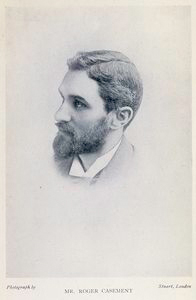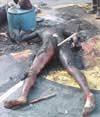
Since the above was written, I have read most of the original source material relating to alleged Belgian atrocities in the Congo, and my ideas have changed. I now believe that there is some considerable truth to these allegations, but that it is important to understand just what it being alleged here:
Just as no white man ever went to Africa and captured a single slave, there is no proof that any white man ever amputated the hand of a single African.
a) first, as I correctly suspected, these atrocities were committed by Africans;
b) secondly, the hands were cut off corpses, except in two cases (Epondo and Ikotobe), which are disputed; if true, the hands were amputated by an African named Kelenga;
c) thirdly, we are not necessarily talking about millions of people.
The stories would be "true" if perhaps half a dozen white officers (who are mentioned by name in the texts) permitted or allegedly encouraged their cannibal African auxiliary troops to ampute the hands of several thousand dead Africans, much as American troops used to ampute the ears of dead Japanese or Vietnamese. One of the missionaries who personally saw a "basket of hands" counted exactly seventeen of them.
Roger Casement found a SINGLE CASE in which an African was forced by another African to drink from a chamber-pot which he was carrying to a river. There is no question of any white involvement or responsibility for this act (THE EYES OF ANOTHER RACE, p. 137). This single incident was magnified by a writer named Michela Wrong (IN THE FOOTSTEPS OF MR KURTZ, pp. 45-46) into a generalized campaign of atrocities committed by whites. It is simply untrue to allege that white Belgians went around cutting the hands off Africans and forcing them to drink urine.
Finally, Joseph Conrad, who, according to Casement, knew the Congo very well, said he never heard of hand-chopping anywhere in the country (EYES, p. 38). This means it cannot possibly have been performed on the scale often imagined by propagandists.
Conrad seems to have distrusted Casement and wanted nothing to do with him (ibid, p. 314, footnote 70). It should be noted that HEART OF DARKNESS is a work of fiction.
It is interesting to note that Michela Wrong has not even read the original Casement reports, which are not listed in the bibliography. She also describes many atrocities which I cannot even find in the Casement reports (ibid, p. 46). She plays down the African atrocities of the 1960s and even the present day, preferring to describe the Congolese as humourous, good-natured, rather chaotic children blaming all their faults on King Leopold and the Belgians. Propaganda aside, however, the book is very good in some ways and no doubt contains much truth.
There are so many problems involved in the whole situation, and with Casement and the report, that it is impossible to form any kind of opinion without reading the source material for oneself.
Incidentally, it is untrue that the "Black Diaries" are obsessed with passive (or even active) anal sex. I find no mention of this anywhere, although he was undoubtedly homosexual. It is amazing what people imagine when they have not read something personally. There are two "Black Diaries", in addition to other material.
In short, conditions under Leopold appear to have been very bad, but no worse than today, in the 1960s, or even under the Arab slave traders before the Belgians ever even got there. That's Africa.
This is not to say that Leopold's Congo was not very badly mismanaged, or that the regime was not guilty of creating a system of mass injustice.
The Congo of Leopold II was the world's first large-scale exercise in "privatization". Leopold spent his entire personal fortune in the Congo, doing some very valuable work in what Casement calls "one of the most savage regions of Africa" (ibid, p. 50), but he was going bankrupt and needed to turn a profit in a hurry. So he did what capitalists and socialist bureaucrats always do: turn the entire population into debt and tax slaves.
Thus, the statement commonly made that "the Belgians used to cut off the hands of Africans who didn't work fast enough, reducing the population of the Congo from twenty million to twelve", is simply not true.
The statement that white Belgians "forced Africans to drink urine" is a lie.
It is true that there was a large dropoff in population over a period of 20 years, which one Belgian anthropologist, Daniel Vangroenweghe, estimates at one and a half million, due to a variety of causes, including sleeping sickness (ibid, pp. 34, 316, footnote 110).
Apart from that, it is in the nature of a wrong to be exaggerated, and I am not interested in arguing about the numbers of victims in what was a situation of obvious injustice.
When the Congo was taken over by the Belgian state, Belgian colonialism evolved into something very humane and beneficial, which is the way it started out.
On p. 124 of the same book, Casement remarks, "The foregoing entries made at this time in my note-book seemed to me, if not false, greatly exaggerated, although the statements were made with every air of conviction and sincerity".
The "foregoing entries" (pp.118-124) impress me personally as a pack of lies.
The allegation of "one hand for one bullet" appears to be simply a legend based on a "disused diary" abandoned by an official who disappeared (ibid, pp. 88-89, 325). Elsewhere, it is stated that there were absolutely "no legal limits" on the amounts of ammunition which could be expended (ibid, p. 112-113).
There were also serious native uprisings with heavy fighting ("a large-scale rebellion went on in the northern part of the country between 1897 and 1900", ibid, p. 321, footnote 43, see also Wrong, p. 45).
As always in Belgium, officials guilty of gross negligence, incompetence or malfeasance were never punished; intelligent regulations issued on paper (for example, an 1898 decree stating that African troops were not to go on patrol without European officers, and were not to carry out reprisals; if reprisals were required, they were to be carried out by Europeans) were inadequately enforced. On the other hand, it is admitted that many Belgian officials were capable and conscientious. Much of what Casement describes reminds me of Belgium today (in fact, tax systems everywhere).
I now believe that the Casement "black diaries" are authentic, but that they are not sufficient to discredit Casement's findings, either in the Congo or in South America, although the possibility of an ulterior motive for some of Casement's actions remains.
Casement's 1910 Putamayo Diaries contain one very strange remark: Casement says that the Africans were never afraid of bloodshed; on the contrary, they liked it; and that whites in Africa could never have acted the way Peruvians did in the Putamayo Region between Colombia and Peru, because they would have been massacred after the first few murders (ROGER CASEMENT'S DIARIES 1910: THE BLACK AND THE WHITE, Sawyer, p. 180).
One wonders how this is compatible with much of the rest of what he says.
At any rate, this was over a century ago.
The only people committing atrocities in Africa today are the Africans, and they have nobody to blame for it but themselves.
But just watch them try.
I lived in Belgium for 18 years and I know the Belgian people.
They are not a nation of hand-choppers and sadists.
-C.P., 4 October 2007
----
Perhaps the Belgians are to blame for the following as well:
UN expert: Rape rampant in Congo
By BRADLEY S. KLAPPER, Associated Press Writer Mon Jul 30, 12:11 PM ET
GENEVA - Sexual atrocities in Congo's volatile province of South Kivu extend "far beyond rape" and include sexual slavery, forced incest and cannibalism, a U.N. human rights expert said Monday.
Yakin Erturk called the situation in South Kivu the worst she has ever seen in four years as the global body's special investigator for violence against women. Sexual violence throughout Congo is "rampant," she said, blaming rebel groups, the armed forces and national police.
"These acts amount to war crimes and, in some cases, crimes against humanity," said Erturk, who just came back from an 11-day mission there.
Most of the worst abuses have been committed by rebel groups, many of whom fled to Congo after taking part in the Rwandan genocide of the 1990s, she said.
"The atrocities perpetrated by these armed groups are of an unimaginable brutality that goes far beyond rape," she said in a statement. "Women are brutally gang raped, often in front of their families and communities. In numerous cases, male relatives are forced at gun point to rape their own daughters, mothers or sisters."
The statement continued: "Frequently women are shot or stabbed in their genital organs, after they are raped. Women, who survived months of enslavement, told me that their tormentors had forced them to eat excrement or the human flesh of murdered relatives."
Saying the situation required immediate attention from Congo's government and the international community, Erturk reported that 4,500 cases of sexual violence had already been counted so far this year. The U.N. investigator said the actual number of incidents was probably much higher.
The Panzi hospital, a specialized institution in Bukavu near the Rwandan border, sees about 3,500 women a year suffering fistula and other severe genital injuries resulting from atrocities, Erturk said.
The mineral-rich eastern reaches of Congo, bordering Uganda, Rwanda and Burundi, are the most unstable in the country, and civilians are often killed as rival militias clash.
U.N. peacekeepers helped end a wider 1998-2002 war in Congo that engulfed six neighboring countries, and the nearly 18,000-strong force currently in Congo is the U.N.'s largest peacekeeping operation.
While rebels commit most of the worst abuses, Erturk said government forces and national police are responsible for nearly 20 percent of all cases of sexual violence reported.
Army units have deliberately targeted communities suspected of supporting militia groups "and pillage, gang rape and, in some instances, murder civilians," she said.
Erturk, who also visited the country's Equator province and Ituri district, said she was "shocked" to discover that police and armed forces respond to unrest with indiscriminate reprisals.
The tactics include "pillaging, torture and mass rape," she said, citing a December incident when 70 police officers took revenge for the torching of a police station in Karawa by burning the Equator town, torturing civilians and raping at least 40 women, including an 11-year-old girl.
No police officer has been charged or arrested in relation to the atrocities, she said, adding that similar operations have since been carried out in Bonyanga and Bongulu, also in Congo's northwest.
"The justice system is in a deplorable state," Erturk said. "It is overwhelmed even by the limited number of cases, in which women brave all obstacles and dare to report sexual violence. Reports of corruption and political interference in the judicial process are widespread."
Erturk will report her findings in September to the U.N. Human Rights Council.

Pole-vault jumping, African style
For video of black mob stoning and burning a black girl to death,
see: -- (may be available on youtube)
Don't forget the popcorn!
--
See also: Niggerology